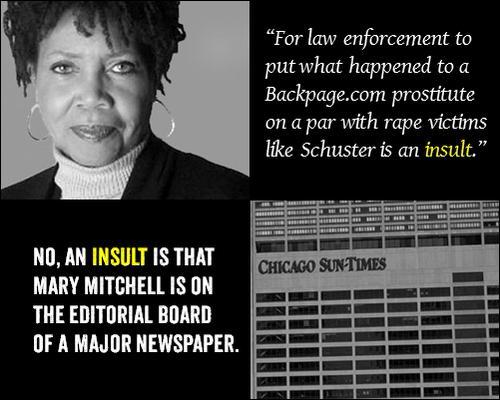
On September 12, the Chicago Sun-Times published an opinion piece in which Mary Mitchell questioned whether the recent sexual assault of a sex worker--at gunpoint--should be called and prosecuted as rape.
In the op-ed, Mitchell referred to the victim as an "unidentified prostitute" or "Backpage.com prostitute." She mocked that the victim would call 911 rather than going to a "pimp." She called forced sex at gunpoint "theft of services." She stated that taking the sexual assault of a sex worker seriously "minimizes the act of rape," is "an insult" to real victims, and "makes it look like sex trafficking is a legitimate business." She blamed the victim, stating that "when you agree to meet a strange man in a strange place for the purpose of having strange sex for money, you are putting yourself at risk for harm."

c. PhotoGroffee, courtesy of Research Project Germany - all rights reserved
That anyone, let alone an editorial board member at a major newspaper, would take offense when police, for once, take violence against one of the most marginalized and stigmatized populations in the world seriously, is appalling. And yet, depressingly, Mitchell is not alone in this sentiment. In 2007, Philadelphia judge Theresa Carr-Deni dismissed sexual assault charges against four men who had gang-raped a sex worker at gunpoint, stating--like Mitchell--that the case "minimizes true rape cases and demeans women who are really raped." Carr-Deni remains on the bench, despite protests. And only last month, a Detroit police officer used the same victim-blaming logic when a young woman who advertised on Backpage was murdered, saying "It's dangerous...Any time you engage in high-risk behavior, you are at risk."
When Mitchell writes that "it's tough to see this unidentified prostitute as a victim," she is expressing an attitude towards people involved in the sex trade that permeates our society, an attitude that enables perpetrators and prevents sex workers from equal access to the criminal justice system and victim's services.
The belief that people who sell sex are not legitimate victims or are "asking for it" underlies the continued dearth of targeted anti-violence services--hotlines and bad date lists--for sex workers in Chicago and across the United States. It is why, until 2013, sex workers who were raped were denied access to victim's compensation funds in the state of California. This belief impedes sex workers' access to criminal justice: sex workers often do not report violence to the police, and when they do, they are often ignored or blamed for their own victimization. When they do press charges, prior prostitution convictions often aren't excluded from evidence by rape shield laws. And it motivates perpetrators themselves: Gary Ridgeway, who murdered over 48 sex workers in the nineties, said that he targeted them because he "hated prostitutes" and thought he "could kill as many as [he] wanted without getting caught." Robert Hasen, who murdered dozens sex workers in Alaska, said the same. Rather than outliers, Ridgeways and Hasens are common among serial offenders, and as many as a third of all serial killers include sex workers among their victims.
Over the past decade, sex worker rights, anti-trafficking, and women's advocacy organizations have made incredible progress in attacking the belief that sex workers can't be raped and made massive progress in ensuring that sex workers had access to criminal justice and victims services. Optimistically, I thought that we had reached a point where the mainstream media recognized the humanity of people impacted by the sex trade, and was finally in consensus that all people deserve access to the criminal justice system. Apparently, we haven't.
The article by Mary Mitchell in the Chicago @Suntimes is one of the most offensive & dehumanising pieces I've ever read about sex workers
— Broke Brehon (@belowcontempt) September 12, 2015
That the Chicago Sun-Times published this dehumanizing, stigmatizing, dangerous piece is unforgivable, and damage has already been done. But perhaps this blatant example of stigma and dehumanization can be used as an opportunity to address much more subtle, more pervasive beliefs about people involved in the sex trade.
At any rate, Mitchell can (and should) issue a public apology to the thousands of women she blamed for their own victimization, and educate herself about violence against sex workers. (If she doesn't, she needs to be removed from the Sun-Times editorial board). The Sun-Times can (and should) use the back-lash Mitchell's piece provoked as an opportunity to start an internal conversation about rape culture and the impact of putting a column that questions whether a woman who was forced to have sex with someone at gunpoint is truly a victim of rape. And communities at large can (and should) take this as a sign that we have a long way to go in fighting rape culture.